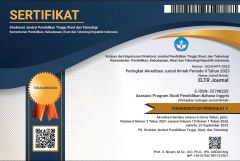THE INFLUENCE OF SYSTEMIC FUNCTIONAL LINGUISTICS ON TEACHING FUNCTIONAL TEXTS IN A WRITING CLASS
Abstrak terlihat: 430 / PDF terunduh: 554DOI:
https://doi.org/10.37147/eltr.v3i1.58Keywords:
Systemic Functional Linguistics, functional text, and registerAbstract
This article analyzed the functional text and register in Systemic-Functional theoretical framework. It explored how both register and genre realized in pedagogic models especially in English business writing course. In English as a foreign-language, writing for functional texts is considered important in teaching learning activities. The register and genre were considered in composing the application letter. It was used the teaching cycle of Genre Based Approach (henceforth GBA) to connect between register and genre in the writing functional text especially in writing application letter activities. There were the models of functional writing provided and the students followed the teaching cycle of GBA the students compose the letter of application. The most noticeable qualities of generic structures and tenor awareness tended to be emphasized by lecturer over less-evident lexico-grammatical patterns. It is also important of how the students’ recognize stages of formal letters. This was suggested that choice of genre and more systematic attention to details of register (especially tenor) awareness are truly important in writing formal letter for learners English for Business Writing class.
Downloads
References
Biber, D., & Conrad, S. (2009). Genre, register and style. Cambridge University Press. Cambridge.
Christie, F. (1992). Literacy in Australia. Annual Review of Applied Linguistics, 12, 142-155.
Christie, F., & Derewianka, B. (2010). School discourse: Learning to write across the years of schooling. A&C Black.
Eggins, S. (1994). An introduction to systemic functional linguistics. London: Pinter Publisher.
Eggins, S., & Slade, D. (1997). Analysing casual conversation. London Washington, D.C.: Cassell.
Eggins, S. (2004). An introduction to systemic functional linguistics. London: Continuum International Publishing Group.
Figueiredo, D. (2010). Context, Regsiter, and genre: Implication for language education. Revista Signos 2010/ 43 Número Especial Monográfico, 1, 119-141. Brasil.
Halliday, M.A.K. (1978). Language as social semiotic: The social interpretation of language and meaning. London: Edward Arnold.
Halliday, M.A.K., & Hasan, R. (1989). Language, context, and text: Aspects of language in a social-semiotic perspective. Deakin University Press. Australia.
Halliday, M. A. K. (1993). Towards a language-based theory of learning. Linguistics and Education, 5, 93-116.
Hyland, K. (2007). Genre pedagogy: Language, literacy and L2 writing instruction. Journal of Second Language Writing, 16(3), 148-164. doi: 10.1016/j. jslw.2007.07.005
Johns, A. M. (2002). Genre in the classroom: Multiple perspectives. Mahwah, N.J.: L. Erlbaum.
Martin, J. (1999). Mentoring semogenesis: ‘Genre-based’ literacy pedagogy. In F. Christie (Ed.), Pedagogy and the shaping of consciousness (pp. 123-155). London; New York: Continuum.
Martin, J. R., & Rose, D. (2003). Working with Discourse. London: Continuum.
Martin, J., & Rose, D. (2007). Working with discourse: Meaning beyond the clause. London: Continuum.
Martin, J. R. (2014). Evolving systemic functional linguistics: beyond the clause. Functional Linguistics, 1(1), 3.
Matthiessen, C.M.I.M. (2006). Educating for advanced foreign language capacities: Exploring the meaning-making resources of languages systemic-functionally. Advanced language learning: The contribution of Halliday and Vygotsky, 31–57.
O’Donnell, M. (2011). Introduction to systemic functional linguistics for discourse analysis. Language, Function and Cognition, 12.
Painter, C. (2001). Understanding genre and register: Implications for language teaching. In A. Burns & C. Coffin (Eds.), Analysing English in a global context: A reader (pp. 167-180). London: Routlege/Macquarie University/The Open University.
Schelppegrel, M. J. (2008). The language of schooling: A functional linguistics perspective. New Jersey: Taylor & Francis e-library.
Thornburry, S. (2005). Beyond the sentence: Introducing discourse analysis. Oxford: MacMillan.
Downloads
Published
How to Cite
Issue
Section
License
Copyright (c) 2019 Leni Irianti

This work is licensed under a Creative Commons Attribution-ShareAlike 4.0 International License.











 ELTR Journal,
ELTR Journal, 